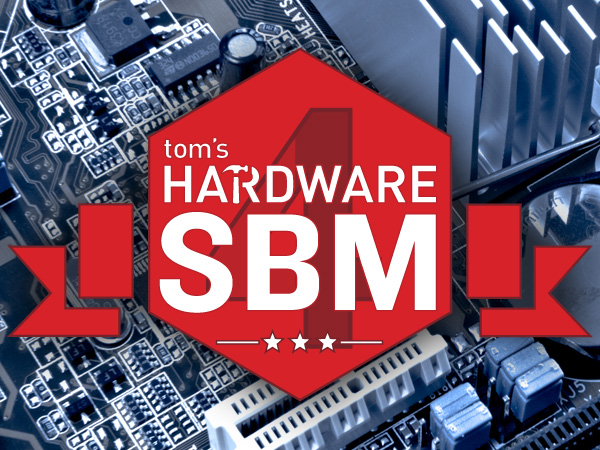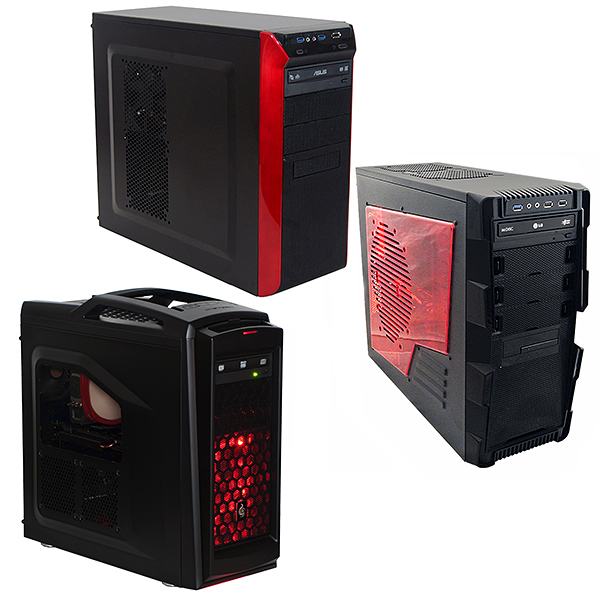System Builder Marathon Q2 2014: System Value Compared
A SBM Based On Reader Feedback
System Builder Marathon, Q2 2014: The Articles
Here are links to each of the four articles in this quarter’s System Builder Marathon (we’ll update them as each story is published). And remember, these systems are all being given away at the end of the marathon.
To enter the giveaway, please fill out this SurveyGizmo form, and be sure to read the complete rules before entering!
Day 1: The Budget Gaming PC
Day 2: Our Mainstream Enthusiast System
Day 3: The Balanced High-End Build
Day 4: Performance And Value, Dissected
Choosing This Quarter's Winning Build
Paul, Don, and I already talked about the various reasons for this quarter’s budget restructuring in each of our respective stories. But the overall rationale involved a handful of requests from the audience. First, we saw a bunch of messages that Paul should return his budget gaming machine to its origins, “The $500 Gaming PC”. Second, we received a lot of requests to narrow the price range between our top and bottom builds. And third, we wanted to address the critique that our systems can't be compared to off-the-shelf machines because they don't include an operating system.
So Paul jumped back to $500, and then added an operating system. Since Don’s PC always costs twice as much as Paul’s, his sacrifice would be twice as great. Even harsher, my high-end build wouldn’t cost four times as much as Paul’s. It'd get a 3x multiplier instead. If you think a 3x jump is still a huge difference, consider the real-world price differences between entry-level and high-end components. My challenge would be great indeed.
Fortunately, we were all fairly close to that sweet spot in budget-oriented performance hardware right around $800 (give or take a couple hundred dollars). Although that sounds like a fairly large margin for error, the market is constantly changing as new mainstream parts are introduced. Furthermore, not all purchase decisions are made equally. For example, Paul was able to pull a value rabbit out of AMD’s hat with the low-cost Athlon X4 750K. Findings like those are probably why Intel finally caved and released an unlocked dual-core Pentium, which wasn’t available yet when we placed our orders.
Get Tom's Hardware's best news and in-depth reviews, straight to your inbox.
Then there was the happy coincidence that the PowerColor graphics cards Don and I bought rose in price a little, but came bundled with a 250 GB Samsung 840 EVO just as our stories were going live. This small miracle addresses the biggest omission from Don's budget-constrained machine and saves me a $150 line item I was already planning to buy. Of course, neither of us gave ourselves credit for the windfall. But hey, as of this writing, the sale is still going on if you want to capitalize.
| System Builder Marathon Q2 2014: The Machines | |||
|---|---|---|---|
| Row 0 - Cell 0 | $600 Gaming PC | $1200 Enthusiast PC | $1600 Performance PC |
| Processor | AMD Athlon X4 750K: 3.4 to 4 GHz, Quad-Core, 4 MB Shared L2 Cache | Intel Core i5-4670K: 3.4 to 3.8 GHz, Quad-Core, 6 MB Shared L3 Cache | Intel Core i7-4770K: 3.5 to 3.9 GHz, Quad-Core, 8 MB Shared L3 Cache |
| Graphics | MSI R7 265 2GD5 OC 2 GB | PowerColor TurboDuo AXR9 290 4GBD5-TDHE/OC Radeon R9 290 | PowerColor PCS+ AXR9 290X 4GBD5-PPDHE Radeon R9 290X |
| Motherboard | ASRock FM2A75M: Socket FM2+, AMD A75 | ASRock Z97 Pro3: LGA 1150 Intel Z97 Express | Asus Z97-A: LGA 1150, Intel Z97 Express |
| Memory | Team Group Dark TDBD38G1600HC9DC01: DDR3-1600 C9, 8 GB (2 x 4 GB) | Team Group Vulcan TLYD38G1600HC9DC01: DDR3-1600 C9, 8 GB (2 x 4 GB) | G.Skill Ripjaws X F3-14900CL8D-8GBXM: DDR3-1866 C8, 8 GB (2 x 4 GB) |
| System Drive | WD Blue WD10EZEX: 1 TB, 7200 RPM, 64 MB Cache | WD Blue WD10EZEX: 1 TB, 7200 RPM, 64 MB Cache | Samsung 840 EVO MZ-7TE250BW: 250 GB, SATA 6Gb/s SSD |
| Power | EVGA 100-W1-0430-KR: 430 W, ATX12V v2.31, 80 PLUS | Corsair CX750: 750 W, ATX12V v2.3, 80 PLUS Bronze | Rosewill HIVE-750: 750 W Semi-Modular, ATX12V v2.3, 80 PLUS Bronze |
| CPU Cooler | AMD Athlon Boxed Fan (included) | Cooler Master Hyper 212 Plus | Thermaltake NiC L32 (CL-P002-AL14RE-A) 140mm |
| Platform Cost | $454 | $1066 | $1362 |
| Storage Drive | (Uses System Drive) | (Uses System Drive) | Western Digital Blue WD10EZEX: 1 TB, 7200 RPM, 64MB Cache |
| Optical | Asus DRW-24B1ST/BLK/B/AS: 24x DVD±R, 48x CD-R | LG GH24NSB0: 24x DVD±R, 48x CD-R | Lite-On iHAS124-04: 24x DVD±R, 48x CD-R |
| Case | Rosewill Redbone U3 | Apevia X-Hermes | CM Storm Scout 2 Advanced |
| Total HW | $519 | $1146 | $1532 |
| OS | Windows 8.1 x64 OEM | Windows 8.1 x64 OEM | Windows 8.1 x64 OEM |
| Total Cost | $619 | $1246 | $1632 |
It's unfortunate that Intel's Devil's Canyon-based CPUs weren't available when we placed our orders back in May. We knew they were being introduced in early June. But they didn't ship out until a couple of days ago. Good thing we didn't wait. On the bright side, though, you can expect at least a couple of us to experiment with Intel's improved Haswell-based, overclocking-friendly models when we place our orders for Q3 here shortly.
I realize that availability now of Core i5-4690K and Core i7-4790K means some of our readers are going to want to go that route instead. But we take comfort in the knowledge that our own tests reveal a mere 100 MHz overclocking advantage compared to a few of the Core i5-4670K and Core i7-4770K CPUs we’ve already tested.
That was also before I discovered the Core i7-4770K in this quarter's high-end machine is the worst-overclocking -4770K I've ever used, causing me to ponder the possibility of Intel setting aside its best dies for -4790Ks well before those newer processors launched. A complete comparison of overclock settings is found on the next page, so onward we go!
Current page: A SBM Based On Reader Feedback
Next Page How We Tested Our Q2 2014 SBM Builds-
TechyInAZ It's interesting how the $1200 build actually beats the $1600 build at 1080P. I can see at ultra wide resolutions but it surprises me at 1080P.Reply -
Herr_Koos On page 2 it says you used a GTX770 for the $600 budget build. Surely this is a typo? The GTX770was from last quarter.Reply -
Crashman Reply
I think your expectations are reversed. Most readers expect a higher CPU clock to boost performance at lower resolutions where the graphics card isn't stressed, and to have little effect at triple monitor resolutions where the GPU limits the frame rate.13593981 said:It's interesting how the $1200 build actually beats the $1600 build at 1080P. I can see at ultra wide resolutions but it surprises me at 1080P.
Thanks, fixed!13594092 said:On page 2 it says you used a GTX770 for the $600 budget build. Surely this is a typo? The GTX770was from last quarter.
-
de5_Roy awesome sbm, awesome articles, all of them. awesome job, guys. this quarter's was a lot of fun. no shortage of interesting stuff, excitement. or drama, lol.Reply -
envy14tpe One thing I notice is that overclocking, even with $30 coolers, seems to give an overall boost in performance of 10%. Not too shabby.Reply -
Crashman Reply
Do you think any of us wants to buy your prize? If we didn't ourselves pay for these OS's, what makes you think we would pay for these OSs?13594434 said:should give the winner his choice of $100 cash or OS
I got my two licenses for like, $20. Though I probably couldn't get any more like that, I don't need any more at the moment, thanks. If you don't want the OS, and you win my PC, just tell me and I'll keep it. Thanks!
-
firefoxx04 The mid range beating the high end in 1080p make sense considering it had a higher cpu clock and only 2-4 threads utilized most likely. I'm sure both gpu were in the 50-70% rangeReply -
Onus Ok, with the final article, time to enter the contest!Reply
Disposition should I be a fortunate winner:
1. Having not messed with a "new" Athlon, I might put a 92mm cooler on it and see what I can get out of it for a week or three. I'd almost certainly contribute a SSD to it, then most likely donate it to a startup I know of that actually is more in need of office-type PCs (but they do play some games).
2. If the motherboard were micro-ATX, I'd probably use most of these parts to upgrade / replace my Phoenix PC, as they represent a platform upgrade. It would be a substantial upgrade to my Omega PC, but I like the idea of maintaining that AM3+ system due to the overall quality of the parts in it. If the Apevia case surprises me due to its quality, I may use it anyway. One way or another, this would lead to another complete system donation though.
3. The parts in this one appear to be of sufficient quality / durability that I would probably end up forsaking the Omega PC for this one. I'd put its 990FX onto my test bench though to keep it around, and donate that one (MSI Z77A-GD65 Gaming) as above.



